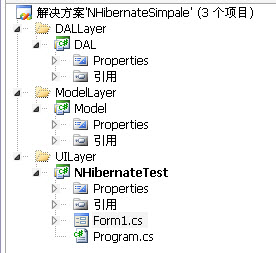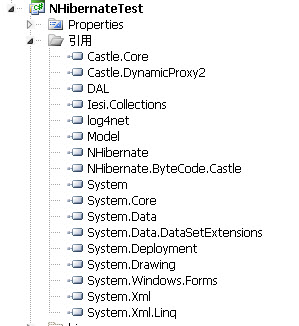首先我对那些,自己认为被我前天的博文设计模式点滴系列(一)鸭子传说中污染到你们视觉的朋友,说声对不起。特别是那些说我的文章没水平或者是抄袭《Head First Design Patterns》第一章的朋友。我承认我的文章没有什么特色,但是我相信在学习中能跨出第一步还是至关重要的。并且我相信,在园子里面有很多没有看过《Head First》的朋友,在看完我的文章之后会去了解这本书,从而吸取书中的精华。这难道不是一个效果吗?所以我相信,即使再瑕疵的东西也能挑出亮点来!
今天我仍旧厚着脸皮,讲述我的NHibernate曲折之行。男人的胸怀是委屈撑大的,多一点委屈,少一些脾气你会更快乐。
之前,看过很多NHibernate的东西。特别是 YJingLee的NHibernate之旅系列比较经典。看得多了,但是还没有真正的从头到尾的做过一边。今天从头到尾做了一遍,发现问题还真多。我就将我做的过程和在这中间碰到的问题跟大家分享一下。也可以让一些初学的朋友少走一些弯路,当然我碰到的很多问题在网上都能找到答案,我也就将一些需要注意点,和出错的点收集一下,然后放到一起,节省大家时间去疯狂Google。大致过程参照YJingLee的NHibernate之旅(2):第一个NHibernate程序。不过YJingLee用的是NUnit测试框架,我这里直接用了一个Windows Form项目来做测试。
我用的开发环境:Visual Studio 2008SP1+SQL Server 2008 + NHibernate-2.1.0.GA最新版。
首先新建一个空的解决方案,命名为NHibernateSimpale,然后新建三个项目分别为DAL类库项目,Model项目,NHibernateTest窗体项目。
然后删除掉自动生成的Class1.cs.

我这里为了演示这个流程,就只创建了一个最简单的数据库,在文章的末尾我会提供将源代码和数据库执行脚本下载。
我新建了一个NHibernate数据库,然后新建三张表,经典的Student,Course,StudentCourse。其实真正用到了就一张表Student。
我这里使用的O/R Mapping的工具是mygeneration。我将其生成的映射文件和实体类文件的两个文件夹Entities和Mappings拷贝至Model文件夹下面,然后将其包含进项目中。这里注意了,第一个问题出现了,我当时在生成映射文件的时候在另外一个路径下,所以生成的默认的命名空间需要改成我现在的Model.Entities的命名空间。
在NHibernateTest里面添加三个配置文件,App.config,NHibernateMSSQL.config,NHibernateOracle.config其中第一个是用来存放数据库的链接字符串的,当然后别的用途。第二个,第三个是用来做NHibernate的配置文件的。这里我是为了实现多数据库的NHibernate的支持。可以让程序有一个比较好的数据库的扩展性。下次如果要从MSSQL换成Oracle或者MYSql只要修改或者增加一个配置文件就OK。
在DAL项目中添加两个类,GetStudent.cs,SessionManager.cs,第一个是用来获取学生信息的。第二个是用来管理NHibernate中的Session,可以说相当于一个帮助类。
经过以上步骤得到如下的结果。当然是没有任何代码的。

接下来先检查Student.hbm.xml中的
<?xml version="1.0" encoding="utf-8"?> <hibernate-mapping xmlns="urn:nhibernate-mapping-2.2"> <class name="Model.Entities.Student,Model" table="Student" lazy="true"> <id name="StudentId" column="StudentId" type="int"> <generator class="native" /> </id> <property type="string" length="40" name="StudentName" column="[StudentName]" /> <property type="string" length="20" name="StudentPassword" column="[StudentPassword]" /> <property type="string" length="40" name="EmailAddress" column="[EmailAddress]" /> <property type="DateTime" name="DateCreated" column="[DateCreated]" /> </class> </hibernate-mapping>
<hibernate-mapping xmlns="urn:nhibernate-mapping-2.2">
<class name="Model.Entities.Student,Model" table="Student" lazy="true">
这里要注意是2.2,不是2.0。
其次是在下面的Model.Entities.Student,Model这里前者是实体,后者是程序集。这个当然只有初学者会有点疑问。
接下来是增加应用程序配置文件信息,首先是在App.config里面加上
<?xml version="1.0" encoding="utf-8" ?> <configuration> <connectionStrings> <!--<add name="Connection String" connectionString="Data Source=YeanJay;User Id=YeanJay;Password=YeanJay;Persist Security Info=true" providerName="System.Data.OracleClient"/>--> <add name="Connection String" connectionString="Data Source=YeanJay;Database=NHibernate;uid=YeanJay;pwd=YeanJay" providerName="System.Data.SqlClient"/> </connectionStrings> </configuration>
这里只是增加了数据库链接字符串,注意:这里的Connection String在NHibernate的配置文件中要用到,所以要保持一致。这里如果要将数据库从MSSql迁移到Oracle,那么我们只要将上面的注释去掉,然后将下面这句MSSQL的注释掉就可以了。
然后来看NHibernate的两个配置文件:NHibernateMSSQL.config和NHibernateOracle.config
>NHibernateMSSQL.config:
<?xml version="1.0" encoding="utf-8" ?> <hibernate-configuration xmlns="urn:nhibernate-configuration-2.2" > <session-factory name="northwind"> <property name="dialect">NHibernate.Dialect.MsSql2005Dialect</property> <property name="connection.provider">NHibernate.Connection.DriverConnectionProvider</property> <property name="connection.driver_class">NHibernate.Driver.SqlClientDriver</property> <property name="connection.connection_string_name">Connection String</property> <property name="connection.isolation">ReadCommitted</property> <!-- Mapping Files --> <mapping assembly="Model"/> </session-factory> </hibernate-configuration>
>NHibernateOracle.config
<?xml version="1.0" encoding="utf-8" ?> <hibernate-configuration xmlns="urn:nhibernate-configuration-2.2" > <session-factory name="northwind"> <property name="dialect">NHibernate.Dialect.Oracle10Dialect</property> <property name="connection.provider">NHibernate.Connection.DriverConnectionProvider</property> <property name="connection.driver_class">NHibernate.Driver.OracleClientDriver</property> <property name="connection.connection_string_name">Connection String</property> <property name="connection.isolation">ReadCommitted</property> <!-- Mapping Files --> <mapping assembly="Model"/> </session-factory> </hibernate-configuration>
这里有一个<mapping assembly="Model">就是之前提到的那个映射实体类的那个程序集。
在开始编写代码之前,我们需要将一些需要的引用添加到每个工程里面:
DAL:引用Model项目和NHibernate.dll
Model:引用Iesi.Collections.dll和NHibernate.dll
在WinForm项目中:根据YJingLee的例子是引用DAL,Model这两个项目,和NHibernate.dll,暂时我们也这么引用。
现在开始编写代码:
SessionManager.cs类:
using System; using System.Collections.Generic; using System.Linq; using System.Text; using NHibernate; using NHibernate.Cfg; using Model; namespace DAL { public class SessionManager { ISessionFactory _sessionfactory; public SessionManager() { _sessionfactory = GetSessionFactory(); } public ISessionFactory GetSessionFactory() { Configuration ctg = new Configuration().Configure("./NHibernateMSSQL.config"); //ctg.AddAssembly("Model"); //return (new Configuration()).Configure().BuildSessionFactory(); return ctg.BuildSessionFactory(); } public ISession GetSession() { return _sessionfactory.OpenSession(); } } }
这里的Configuration ctg = new Configuration().Configure("./NHibernateMSSQL.config");的方式在NHibernate的灵活配置 有讲到。
当然这里的"./NHibernateMSSQL.config"在实际生产中一般不要写到这里来,一般是从配置文件中读取过来。这里为了方便,我就直接写在这里了。
这里我也没有去关心这个线程安全不安全的问题了。见谅!
SessionManager.cs类:
using System; using System.Collections.Generic; using System.Linq; using System.Text; using NHibernate; using Model.Entities; //using NHibernate.Cfg; namespace DAL { public class GetStudent { private ISession _session; public ISession Session { set { _session = value; } } public GetStudent(ISession session) { _session = session; } public Student GetStudentById(int studentId) { return _session.Get<Student>(studentId); } } }
Form.cs 代码:
using System; using System.Collections.Generic; using System.ComponentModel; using System.Data; using System.Drawing; using System.Linq; using System.Text; using System.Windows.Forms; using DAL; using NHibernate; using Model.Entities; namespace NHibernateTest { public partial class Form1 : Form { public Form1() { InitializeComponent(); } private ISession _session; private SessionManager _helper = new SessionManager(); private GetStudent _getStudent; private void Form1_Load(object sender, EventArgs e) { _session = _helper.GetSession(); _getStudent = new GetStudent(_session); Student student = _getStudent.GetStudentById(1); this.textBox1.Text = student.StudentName; this.textBox2.Text = student.StudentPassword; } } }
OK,开始执行。
叮!第一个错误跳出来:
“NHibernate.Cfg.Configuration”的类型初始值设定项引发异常。
查看详细信息:
未能加载文件或程序集“log4net, Version=1.2.10.0, Culture=neutral, PublicKeyToken=1b44e1d426115821”或它的某一个依赖项。
系统找不到指定的文件。
第一次想到在DAL中加入log4net.dll(这个dll在下载过来的最新版的NHibernate的bin文件夹下有的)。没想到问题依然存在,那好,就先撤销在DAL中的log4net,然后直接到Winform下添加log4net结果错误消失了。但是第二个错误 咚!又出来了!
The following types may not be used as proxies:
Model.Entities.Course:method get_IsDeleted should be 'public/protected virtual' or 'protected internal virtual'
Model.Entities.Course: method set_IsDeleted should be 'public/protected virtual' or 'protected internal virtual'
Model.Entities.Course: method get_IsChanged should be 'public/protected virtual' or 'protected internal virtual'
Model.Entities.Course: method set_IsChanged should be 'public/protected virtual' or 'protected internal virtual'
Model.Entities.Course: method Clone should be 'public/protected virtual' or 'protected internal virtual'
Model.Entities.StudentCourse: method get_IsDeleted should be 'public/protected virtual' or 'protected internal virtual'
Model.Entities.StudentCourse: method set_IsDeleted should be 'public/protected virtual' or 'protected internal virtual'
Model.Entities.StudentCourse: method get_IsChanged should be 'public/protected virtual' or 'protected internal virtual'
Model.Entities.StudentCourse: method set_IsChanged should be 'public/protected virtual' or 'protected internal virtual'
Model.Entities.StudentCourse: method Clone should be 'public/protected virtual' or 'protected internal virtual'
Model.Entities.Student: method get_IsDeleted should be 'public/protected virtual' or 'protected internal virtual'
Model.Entities.Student: method set_IsDeleted should be 'public/protected virtual' or 'protected internal virtual'
Model.Entities.Student: method get_IsChanged should be 'public/protected virtual' or 'protected internal virtual'
Model.Entities.Student: method set_IsChanged should be 'public/protected virtual' or 'protected internal virtual'
Model.Entities.Student: method Clone should be 'public/protected virtual' or 'protected internal virtual'
这个就是在老赵今天发的我对NHibernate的感受(2):何必到处都virtual的提到的到处都是Virtual了,在MyGeneration生成的映射文件中,有些方法并不是Virtural的,所以会出现编译通过,但是执行出错的情况。
解决方案,当然是在每个方法和属性上面加上Virtual了。
处理完这个错误,当然还是没有那么顺利就过关啦,第三个错误依旧报来!

这也就是需要注意的另外一点:在2.1版本中的NHibernate中需要在NHibernate配置文件中加入
<property name='proxyfactory.factory_class'>NHibernate.ByteCode.Castle.ProxyFactoryFactory, NHibernate.ByteCode.Castle</property>
这样一节,这个来源于YJingLee博客里的一个答复。
加入以后,继续编译,执行。叮叮!!又来一错误:
“NHibernate.ByteCode.Castle.ProxyFactory”的类型初始值设定项引发异常。
查看详细信息:
未能加载文件或程序集“Castle.DynamicProxy2, Version=2.1.0.0, Culture=neutral, PublicKeyToken=407dd0808d44fbdc”或它的某一个依赖项。
系统找不到指定的文件。
当然应该也是2.1的版本的缘故咯。然后继续到源码文件夹下的bin目录下找到这个DLL,添加。具体信息可以参考这里。
继续编译执行。继续出错:
未能加载文件或程序集“Castle.Core, Version=1.0.3.0, Culture=neutral, PublicKeyToken=407dd0808d44fbdc”或它的某一个依赖项。系统找不到指定的文件。
神呐,继续找问题,继续添加引用。
继续编译。现在发现在Winform下的引用已经很多了。都是NHibernate2.1执行的依赖项。
全部添加完,相变的引用如下:

这些引用都可以在NHibernate源码的bin目录下可以找到。
接下来编译。测试通过!!!
执行的界面如下:

数据库执行脚本下载,项目源代码下载。